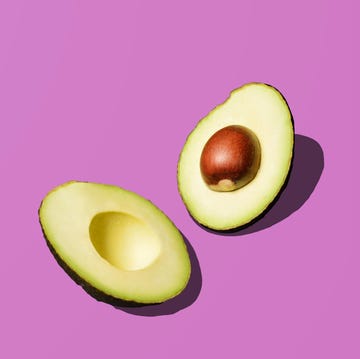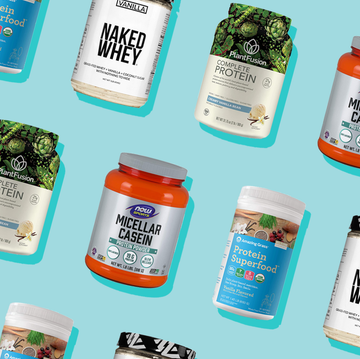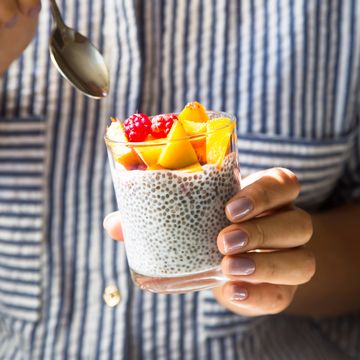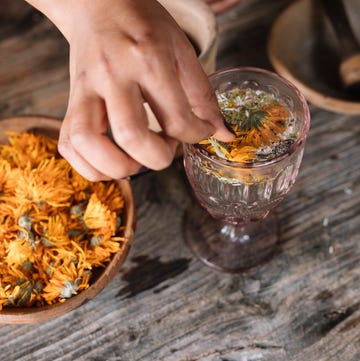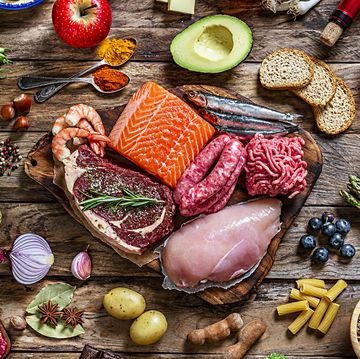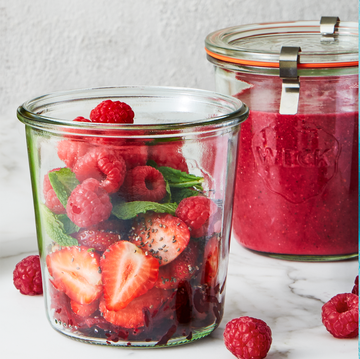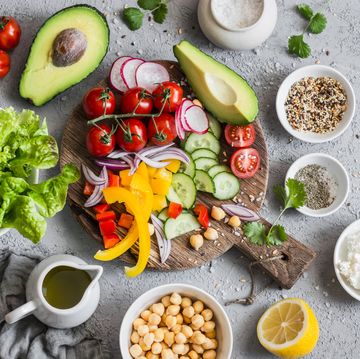The Chhabra household of Plano, TX, couldn't resolve a family dispute. "My husband and I are vegetarian," says Babita Jain Chhabra. "Our family already eats more fruits and vegetables than most people, and they're expensive." Her husband wanted to buy cheap produce at Walmart. Babita said no—the family should buy organic products because their two children needed the healthiest food possible.
"She just assumed organic was healthier," says Babita's 16-year-old daughter, Ria, channeling her father's skepticism. "That's what sparked my interest."
Ria, who was only 13 when the organic debate broke out at her dinner table, decided to settle it. She launched a middle school science fair project that bloomed into more than 2 years of research and eventually involved two Southern Methodist University researchers, Santharam Kolli and Johannes H. Bauer. This year, their study, which found that fruit flies that ate organic foods did better in almost every health measure the researchers tracked (living longer, laying more eggs, resisting stress better, and acting livelier) than those that ate conventionally grown food, was published in PLOS One, an online peer-reviewed scientific journal.
For the Chhabras, it was case closed. They are now buying organic. "Because of Ria's experiment, we know that in the long run, organic food will be better for us than anything else," Babita says.
Most Americans are dabbling in organics—81% of families buy organic at least some of the time, according to a 2013 survey by the Organic Trade Association. And there are plenty of experts who think everyone should be as decisive as the Chhabras. One of them is Charles Benbrook, PhD, a research professor at Washington State University's Center for Sustaining Agriculture and Natural Resources.
Last year, when a widely publicized Stanford University study analyzing more than 200 research papers comparing the benefits of eating organic versus conventionally grown food concluded that organic food isn't any healthier, Dr. Benbrook corrected their math. Utilizing government data on pesticide toxicity, he countered with his own findings that there's a full 94% reduction in health risks if you eat organic rather than conventional foods. The Stanford researchers had looked at nine old studies about pesticide residue on produce and noted that organics have 30% fewer toxins than conventional crops—but failed to calculate the health benefits based upon the most recent USDA data on actual residues in food.
It's About Pesticides
The problem with the Stanford study, as many critics noted, was that it, like many other studies, defined healthy as "has more nutrients." While it's true that organic foods often contain slightly higher levels of antioxidants and vitamin C, most consumers prefer them for what they don't contain: To paraphrase a Clinton-era politico, it's the pesticides, stupid. (Which science has previously linked to food allergies.)
[pagebreak]
"Several studies have shown how low levels of pesticides in particular can cause personal health problems," says Jessica Shade, PhD, the director of science programs for the Organic Center, a nonprofit research and education organization in Washington, DC.
While any piece of fruit or vegetable may contain low levels well within federal safety guidelines, concerns center more on "pesticide load"—cumulative exposure to multiple pesticides over long periods. That makes children a special worry. A 2012 report in the journal Pediatrics, which said that organics have been "convincingly demonstrated to expose consumers to fewer pesticides associated with human disease, " pointed to numerous studies showing that exposure to pesticides may affect brain development. In one, the odds that 8- to 15-year-olds would have ADHD rose 55% with a 10-fold increase in urinary concentrations of organophosphates, among the most common agricultural pesticides. Other studies have linked mothers' pesticide exposure during pregnancy to lower IQs and problems with memory and reasoning in their children.
Not everyone may be equally affected. "Risks may be highest in people who are genetically predisposed," Dr. Shade says.
The "Gift" That Keeps On Giving
Another frightening aspect that wasn't part of the Stanford study's calculations: genetic changes triggered by pesticide exposure in utero that, animal studies show, are passed from generation to generation. In one study at Washington State University, mice were exposed in utero to vinclozolin, a commonly used fungicide that is also an endocrine disruptor—a chemical that interferes with the mammalian endocrine, or hormone, system and may cause developmental, reproductive, or neurological problems. Three-quarters of the rodents' third-generation progeny developed abnormalities in their testes, prostates, sperm, and ovaries; 34% had two or more diseases.
And things are not likely to get better on the pesticide front. In fact, Americans are likely to be exposed to even more pesticides in the food supply, increasing their pesticide load. That's thanks to GMOs—shorthand for genetically modified organisms. Biotech companies (like Monsanto) have genetically altered plants, making the crops themselves poisonous to specific pests, such as worms in corn.
Other GMO plants are genetically engineered to be resistant to herbicides so farmers are able to kill weeds with products like Roundup, which contains a potential endocrine-disrupting chemical, without endangering food crops in the same field. The original promise of this technology was that farmers would need fewer pesticides. However, the pests and weeds are quickly developing immunity to the genetic modifications, so farmers have to spray more, not fewer, chemicals to protect their crops. As of July, the EPA raised the "permitted tolerance levels" of residue of glyphosate (Roundup's active ingredient, which the EPA considers "minimally toxic") to allow for the increased levels of pesticide residues left behind by the increased spraying. That ruling affects food raised for human consumption (including carrots and sweet potatoes, boosting allowable residue levels to 10 to 20 times previous limits) and animal feed.
More from Prevention: What Organic Labels Really Mean
[pagebreak]
US farmers use about 1.1 billion pounds of pesticides a year, and the residue can last for days or even years in the environment.
Right now, American farmers use about 1.1 billion pounds of pesticides a year on their crops. The residues can linger for days, weeks, months, and even years in the environment, including the soil, air, and water. Pesticides pollute drinking water, and some organic farms are subject to "pesticide drift"—when pesticides used by conventional farmers travel through air or water to contaminate organic crops. And the chemicals live in us. The CDC monitors 212 of them, including some agricultural pesticides, in the blood and urine of a representative sample of 2,500 people. Many of these environmental toxins can be passed from mother to child in utero, where they can cause birth defects, learning disabilities, and even fertility problems later on.
It's practically impossible to avoid GMOs in your diet unless you go organic. An estimated 88% of corn and 94% of soy is GMO, according to the USDA.
Though animal studies don't always apply to humans, and the final word about whether organic foods are more nutritious than conventionally grown isn't yet in, "my position is that it's better to be safe from the start by choosing organic," Dr. Shade says. For children, at least, the payoff is immediate: One study found that pesticide residues disappear from children's urine within 5 days of replacing conventional food with organic. (These healthy kids' snacks are ones you'll love, too.)
Babita Chhabra says that's what she keeps in mind when she shops for produce. And her family has reaped other rewards. Though she pays an average of $100 a week for vegetables and fruit, compared with the $70 she used to pay, it has made her a more savvy shopper: "If I'm spending more, I don't pick up more food than I know we'll eat," she says.
And that brings the Chhabras a bonus that most parents eager to get their kids to eat more fruits and vegetables would find valuable: "If you know it's good for you," daughter Ria says, "you want to eat it more."
More from Prevention: Buying Organic On A Budget

Richard Laliberte is an award-winning veteran health journalist and former senior writer at Men's Health who writes for some of the nation's best-known magazines, blogs for WeightWatchers.com, and has authored several books.


